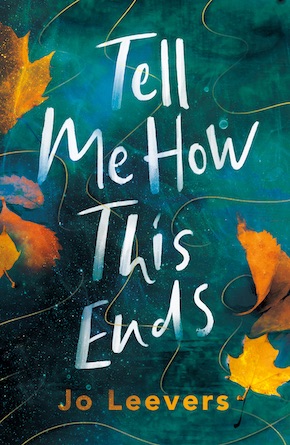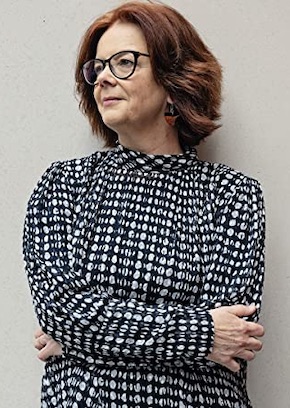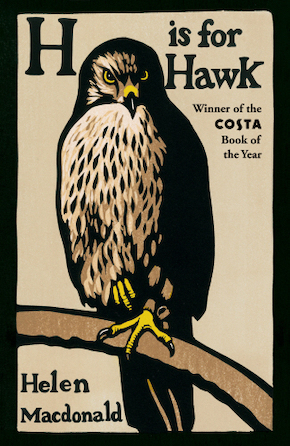Grief is the word
by Jo Leevers
Losing your mother and then a best friend to cancer within a short timeframe does strange things to you. Like motivate you to finally get round to writing the novel you’ve always wanted to write because – cliché alert – Life Is Short. So my debut novel Tell Me How This Ends was born of grief, but in it I wanted write about buried grief and the facts of dying in an honest way. I also wanted to include flashes of humour and hope, because they, too, are part of the wild emotional mix you go through.
These are some books that delve into grief and have struck a chord with me at various times. Oh, and I’ve also sneaked in a film, which is based on a short story by Annie Proulx. I think you know the one I mean. Bring tissues.
—
Boys Don’t Cry by Fíona Scarlett
I took this book on holiday, which was just as well because it meant I had my sunglasses to hide behind. I’m not generally a crier, but the story of brothers Finn and Joe broke me – in a good way. Twelve-year-old Finn is going to die – that’s not a spoiler, we’re told this from the start – and the knowledge makes what follows all the more poignant. Scarlett’s writing is superb and never mawkish as she traces how the brothers and their family deal with Finn’s diagnosis and treatment. The backdrop is life in high-rise council flats of Dublin, where drug crime is as much a part of daily life as the sound of the ice cream van in summer. It’s about masculinity, working-class lives and the devastating knowledge of a cancer that can’t be outrun. I loved its honesty and the way that your feelings are fully engaged but never feel manipulated.
Dear Life by Rachel Clarke
I read this when I was grieving, still trying to make sense of what I’d witnessed but felt very woefully unprepared for. Clarke’s book was a turning point for me, explaining and normalising what happens when a person comes to the end of their life. It’s a memoir about Clarke’s work as a palliative care specialist in a hospice and the people she meets. It reveals how the knowledge that the end is coming can, in fact, make living one’s remaining life so much sweeter. But at the core of the book lies the story of her father, a GP who inspired Clarke to go into medicine and has a terminal diagnosis. This hugely compassionate book feels uplifting rather than depressing – a celebration of life as much as a meditation on death – and I’m grateful for Clarke’s sensitive, sensible words.
We All Want Impossible Things by Catherine Newman
I admit I was sceptical when I started reading this. A story about someone’s best friend dying in a hospice that’s funny – oh, and also has plenty of inappropriate sex. Seriously? But once I was a few pages in, I couldn’t put it down. And the more I read, the more I came to understand and love the main character Ash. And Newman is right – there is an inherently surreal, almost hysterical aspect to watching someone you love slide into the in-between world between living and death, and the ways in which the people around them behave. Newman is brilliant at showing that humour can be the flipside of grief and she gets to the heart of why we hurt.
Grief is the Thing with Feathers by Max Porter
At times, this novel almost feels like a mischievous form of poetry, one that holds you in its talon-grip and toys with you. Crow invades the home of a widower, who happens to be a Ted Hughes scholar, and his two sons, promising to care for them all like a warped Mary Poppins. “I won’t leave until you don’t need me any more,” Crow tells them. The narrative switches between the father, the sons and Crow, a raucous sometimes foul-mouthed beast that eventually decides the time is right to leave. The ending, with a scattering of the mother’s ashes, is just beautiful.
Transcendent Kingdom by Yaa Gyasi
Gifty is a neuroscientist, still grieving the brother she lost to addiction. Meanwhile her mother, who has come to stay, is deeply depressed and unable to get out of bed. Each day, Gifty goes to work in a lab where she tests mice, trying to understand impulse control – i.e. why some succumb to addiction and others manage to resist. This is interwoven with memories of growing up as the child of Ghanaian immigrants who moved to predominantly White Alabama, and of her charismatic brother Nana. Alongside unpicking grief, it’s a book that explores addiction and the immigrant experience with a devastatingly gentle touch.
This is no whimsical ‘how an animal healed me’ tale, more a raw recounting of how Macdonald has to break down her old self and remake it in order to survive.”
H is for Hawk by Helen Macdonald
Early on in Helen Macdonald’s autobiography, the unexpected death of her father sends her into what she calls “a madness designed to keep me sane”, to protect her from the disjunct between her interior life and the everyday life that continues to plod along around her. A better solution is her decision to train a young goshawk, a bird that is notoriously difficult to tame. “Bulkier, bloodier, deadlier, scarier,” she tells us, than other hawks. This is no whimsical ‘how an animal healed me’ tale, more a raw recounting of how Macdonald has to break down her old self and remake it in order to survive. The descriptions of the hawk, Mabel, are sublime.
The Consequences of Love by Gavanndra Hodge
Hodge’s childhood was far from ordinary: her father was a Chelsea hairdresser who sold drugs to aristocrats; her a mother a former model and an alcoholic. When Gavanndra is 14 and her sister Candy is nine, Candy dies suddenly on a family holiday abroad, from a rare virus. Now an adult, Gavanndra can barely remember the sister she loved, and whose death broke their already pretty dysfunctional family. Her memories of Candy are locked away, just as her sister’s ashes are shut inside a box. This book tells the story of how Hodge learned to remember her sister. It’s an honest memoir about repressed trauma and reassessing the past.
Lost Cat by Mary Gaitskill
The writer rescues a feral kitten she finds on a trip to Italy, bonds with it and brings back to the US. She names it Gattino. When Gattino disappears – “He is probably dead but I don’t know for certain” – Gaitskill grieves. And then she interrogates the reasons why this loss has hit her so hard. She’s entirely unsentimental in uncovering what, or rather who the lost cat might represent, writing about her father and two children she and her husband Peter fostered during holidays, a well-meaning but inherently flawed enterprise. This memoir is about imperfect relationships, of letting go and why some losses resonate.
Ghost Girl, Banana by Wiz Wharton
Lily can barely remember Sook-Yin, the mother she lost as a small child and who came to London from Hong Kong in 1966. But 31 years later, a letter about a mysterious inheritance sends Lily on a trip to her mother’s birthplace, where she unravels a mystery that lies at the heart of her family’s history and dynamics. Chapters alternate between Lily and Sook-Yin, until their two stories converge in heartbreaking ways. Partially inspired by the diaries of the author’s mother, this is both a love letter to a remarkable woman and an expertly woven story about how guilt and grief can destroy relationships. It’s a celebration of dual heritage culture and, for me, a reminder of how we never forget the mothers who inspired our own stories.
Brokeback Mountain, directed by Ang Lee
It’s doomed love, its two people who can’t say what they feel, or be who they are, and it’s that heartbreaking moment when Ennis goes to Jack’s old room at his parents’ house and finds his own shirt hanging in the closet, tucked inside Jack’s. It’s grief distilled: the realisation that there’s no going back, no second chances, just regrets and memories. “Jack, I swear…”
—

Jo Leevers is a journalist and author from London, now based in Bristol. She writes about interior design for newspapers and magazines, including the Observer, the Guardian, The Times, Livingetc and Homes & Gardens, and her non-fiction book, Victorian Modern, is published by Thames & Hudson. An early version of her debut novel was longlisted for the Bath Novel Award in 2020. Tell Me How This Ends is out now in paperback, eBook and audio download from Lake Union and is a BBC Radio 2 Book Club choice.
Read more
joleevers.com
Twitter: @joleevers
Instagram: joleevers
@AmazonPub
Author photo by Charlotte Gray




